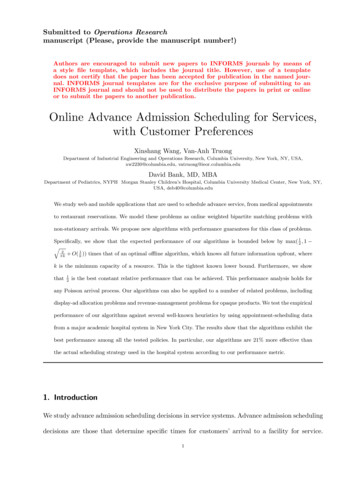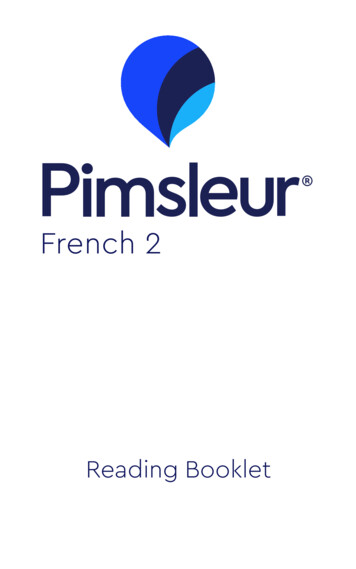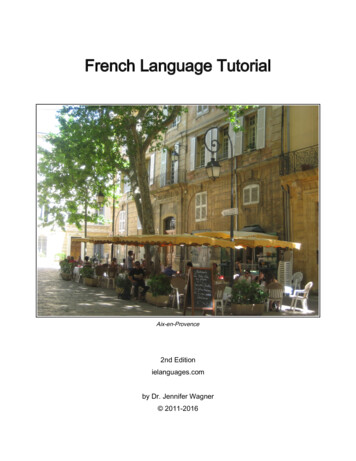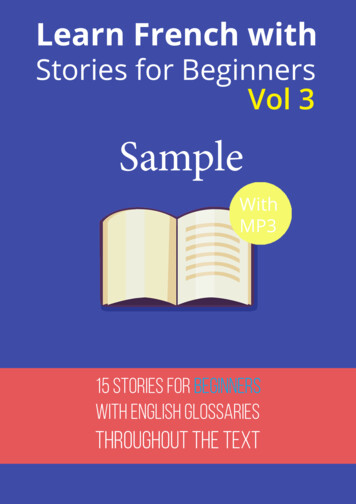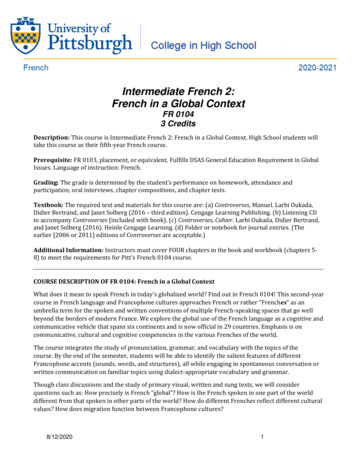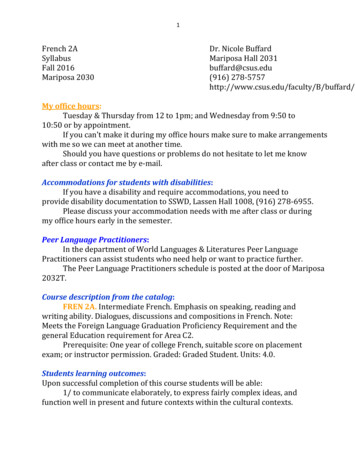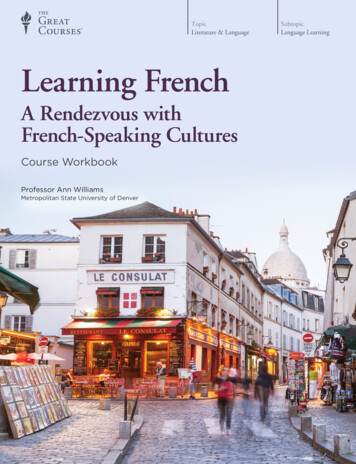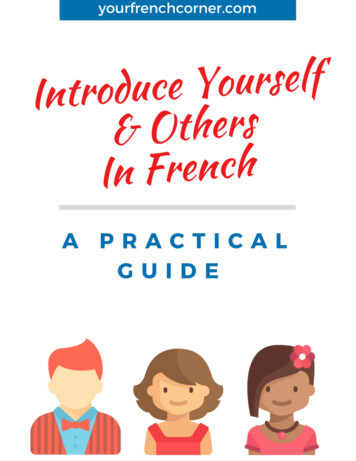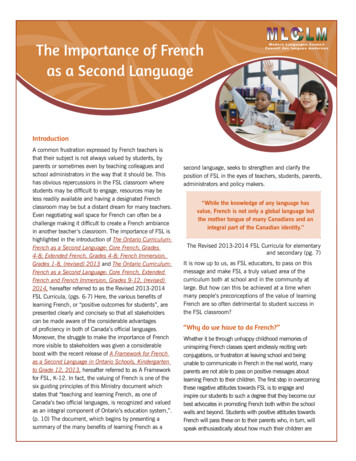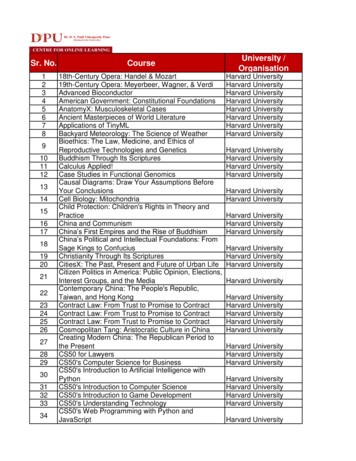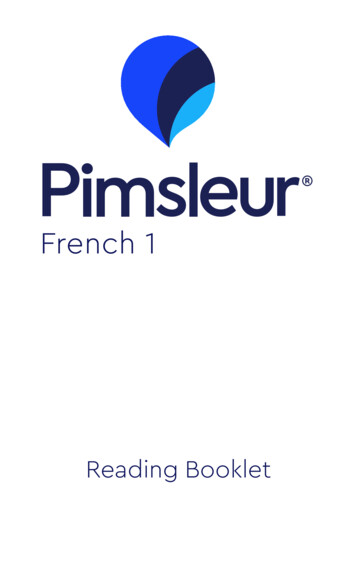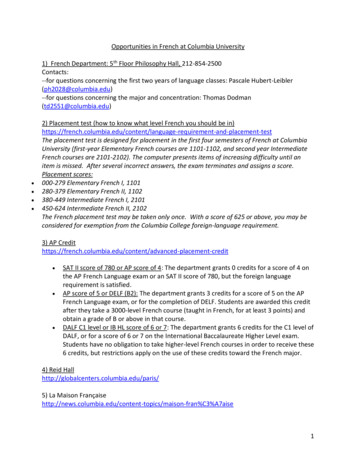
Transcription
Opportunities in French at Columbia University1) French Department: 5th Floor Philosophy Hall, 212-854-2500Contacts:--for questions concerning the first two years of language classes: Pascale Hubert-Leibler(ph2028@columbia.edu)--for questions concerning the major and concentration: Thomas Dodman(td2551@columbia.edu) 2) Placement test (how to know what level French you should be quirement-and-placement-testThe placement test is designed for placement in the first four semesters of French at ColumbiaUniversity (first-year Elementary French courses are 1101-1102, and second year IntermediateFrench courses are 2101-2102). The computer presents items of increasing difficulty until anitem is missed. After several incorrect answers, the exam terminates and assigns a score.Placement scores:000-279 Elementary French I, 1101280-379 Elementary French II, 1102380-449 Intermediate French I, 2101450-624 Intermediate French II, 2102The French placement test may be taken only once. With a score of 625 or above, you may beconsidered for exemption from the Columbia College foreign-language requirement.3) AP -placement-credit SAT II score of 780 or AP score of 4: The department grants 0 credits for a score of 4 onthe AP French Language exam or an SAT II score of 780, but the foreign languagerequirement is satisfied.AP score of 5 or DELF (B2): The department grants 3 credits for a score of 5 on the APFrench Language exam, or for the completion of DELF. Students are awarded this creditafter they take a 3000-level French course (taught in French, for at least 3 points) andobtain a grade of B or above in that course.DALF C1 level or IB HL score of 6 or 7: The department grants 6 credits for the C1 level ofDALF, or for a score of 6 or 7 on the International Baccalaureate Higher Level exam.Students have no obligation to take higher-level French courses in order to receive these6 credits, but restrictions apply on the use of these credits toward the French major.4) Reid Hallhttp://globalcenters.columbia.edu/paris/5) La Maison maison-fran%C3%A7aise1
French is second only to English for the number of countries where it has official status – 32 asopposed to 45. French is also the only language, with English, that is taught in every country ofthe world, with 100 million students and 2 million teachers – 20 % of whom are outside offrancophone countries.Kinshasa is the world’s second largest French speaking city, after Paris, and before Montrealand Brussels.French is a working language of the UN and the EU as well as many other internationalorganizations including Amnesty International, Doctors Without Borders, and the Red Cross.Two G-8 countries (France and Canada) are French-speaking countries.The number of French speakers has tripled since 1945 largely since most former Frenchcolonies have kept French as their language of government, education and science.French is the tenth most spoken language in the world, with 229 million speakers.Of all the countries in the world, France is the most visited, with 75 million tourists each year.About a third of basic English words come from French.In the United States, French is the fourth most used language throughout the country (spokenby about 10 million American citizens). It is the second most taught, after Spanish.The reach, breadth, and popularity of the French language is undeniable. It is a language forpoets and writers, for wine lovers and foodies. It is a language embraced by scholars, teachers,and students the world over, and it is spoken between world leaders in business, politics, andsocial justice. And it is one of the most beautiful, musical languages the world has ever known.2
Columbia UniversityDepartment of French and Romance PhilologySYLLABUS FRENCH 1101 - Elementary French IWelcome to French 1101. The aim of the beginning French sequence (French 1101 and French 1102) is to help youto develop an active command of the language. Emphasis is placed on acquiring the four language skills--listening,speaking, reading and writing--within a cultural context, in order to achieve basic communicative proficiency.Do take advantage of the opportunities offered by the Maison Française (lectures in French and English, caféconversation for beginners, French and francophone films (with subtitles), and more.If you have any questions or concerns about the course, do not hesitate to talk to your instructor or to PascaleHubert-Leibler, Director of the French Language Program (519 Philosophy Hall, 212-854-4819,ph2028@columbia.edu).Required Texts--Voilà! Textbook, 6th edition, Heinle-Cengage Learning--Voilà! Workbook/Lab Manual, 6th edition, Heinle-Cengage LearningThe hard-bound textbook and paper workbook are quite pricey, but the publisher of Voilà has agreed to provideColumbia students with a more affordable version of these books. They will be sold as a bundle consisting of aloose-leaf textbook (which you can put in a binder) and an access card to the electronic version of the workbookand the Cengage resource site (iLrn). We recommend that you get this version, either from the ColumbiaBookstore or directly from Cengage:Introductory French Voila 6e Bundle ISBN: 97812857283913-hole punch textbook with audio CD and iLrn accessBring the chapter of the textbook you are currently working on to class every day, unless instructed to thecontrary by your instructor.If you would like to buy the bundle directly from Cengage, please use this site.If you prefer to use a paper workbook with your textbook, you may do so. However, if you are thinking ofgetting a used textbook, please be advised that buying a new paper workbook or the iLrn access card to theelectronic workbook separately would cost you practically the same as the recommended bundle. DO NOT BUYA SEPARATE CARD FOR JUST THE WORKBOOK (and not iLrn, which offers other resources) as you would not beable to use it. DO NOT BUY THE ELECTRONIC VERSION OF THE TEXTBOOK, your instructor does not want you touse your laptop in class.3
Columbia UniversityDepartment of French and Romance PhilologySYLLABUS FRENCH 1102 - Elementary French IIWelcome to French 1102. The aim of the beginning French sequence (French 1101 and French 1102) is to help youto develop an active command of the language. Emphasis is placed on acquiring the four language skills--listening,speaking, reading and writing--within a cultural context, in order to achieve basic communicative proficiency.Do take advantage of the opportunities offered by the Maison Française (lectures in French and English, caféconversation for beginners, French and francophone films (with subtitles), and more.If you have any questions or concerns about the course, do not hesitate to talk to your instructor or to PascaleHubert-Leibler, Director of the French Language Program (519 Philosophy Hall, 212-854-4819,ph2028@columbia.edu).Required Texts--Voilà! Textbook, 6th edition, Heinle-Cengage Learning--Voilà! Workbook/Lab Manual, 6th edition, Heinle-Cengage LearningThe hard-bound textbook and paper workbook are quite pricey, but the publisher of Voilà has agreed to provideColumbia students with a more affordable version of these books. They will be sold as a bundle consisting of aloose-leaf textbook (which you can put in a binder) and an access card to the electronic version of the workbookand the Cengage resource site (iLrn). We recommend that you get this version, either from the ColumbiaBookstore or directly from Cengage:Introductory French Voila 6e Bundle ISBN: 97812857283913-hole punch textbook with audio CD and iLrn accessBring the chapter of the textbook you are currently working on to class every day, unless instructed to thecontrary by your instructor.If you would like to buy the bundle directly from Cengage, please use this site.If you prefer to use a paper workbook with your textbook, you may do so. However, if you are thinking ofgetting a used textbook, please be advised that buying a new paper workbook or the iLrn access card to theelectronic workbook separately would cost you practically the same as the recommended bundle. DO NOT BUYA SEPARATE CARD FOR JUST THE WORKBOOK (and not iLrn, which offers other resources) as you would not beable to use it. DO NOT BUY THE ELECTRONIC VERSION OF THE TEXTBOOK, your instructor does not want you touse your laptop in class.4
Columbia University, New YorkDepartment of French and Romance Philology515 Philosophy HallGeneral Information for Students in French 2101Welcome to Intermediate French I!If you have not taken French 1102 at Columbia but have had French previously, you must takethe French department’s placement exam to evaluate your knowledge of the language beforeyou can be allowed to stay in this class. You may take the computerized placement exam anyday between 10:00 a.m. and 4:00 p.m. at the French department (515 Philosophy Hall) oronline ementt.htm).COURSE GOALS: This course will further your awareness and understanding of the Frenchlanguage, culture and literature, provide a comprehensive review of fundamental grammarpoints while introducing more advanced ones, as well as improve your mastery of oral, reading,and writing skills. By the end of French 2101, you will be able to read short to medium-lengthliterary and non-literary texts, and analyze and comment on varied documents and topics, bothorally and in writing.Les cours sont enseignés intégralement en français.Do take advantage of the opportunities offered by the Maison Française: lectures in French andEnglish, café conversation, the film series, etc. It’s a good idea to bookmark their Websiteaddress: http://www.maisonfrancaise.org/If you have any questions or concerns about the course, do not hesitate to talk to yourinstructor or to Pascale Hubert-Leibler, Director of the French Language Program (519Philosophy Hall, 212-854-4819, ph2028@columbia.edu).Required Text:Clare Tufts and Hannelore Jarausch, Sur le vif, 6th edition, Boston: Heinle/ Cengage Learning,2014.The bundle (3-hole-punch textbook QUIA access card to the electronic workbook, ISBN:9781285885940) is available at the Columbia University Bookstore.5
Columbia University, New YorkDepartment of French and Romance PhilologyFrench 2102Intermediate IICourse descriptionWelcome to Intermediate French II!PREREQUISITES: FRENCH W2101, BC1203, OR EQUIVALENTIMPORTANT NOTE: 2102 DOES NOT FULFILL THE BARNARD LANGUAGE REQUIREMENTCOURSE GOALS:French 2102 will further your awareness and understanding of French and Francophoneliteratures and cultures as well as improve your mastery of grammar and your speaking andwriting skills. By the end of French 2102, you will be able to understand and analyze various typesof literary texts, discuss concrete and abstract topics orally, and write with clarity and precisionto express viewpoints and respond to the readings.Do take advantage of the many events organized by the Maison française – talks, performances,film screenings, and Café Conversation (every Tuesday from 5:00 to 6:30 p. m.).Le cours est enseigné entièrement en français.REQUIRED TEXTS (available at the Columbia University Bookstore) : Denise Rochat Contrastes : Grammaire du français courant, 2nd edition, PearsonPrentice Hall, 2010. Denise Rochat and Catherine Bloom, Workbook for Contrastes: grammaire dufrançais courant, Pearson Prentice Hall, 2010. Amélie Nothomb, Métaphysique des tubes, Le livre de poche, 2002.6
Beyond the language requirement (Third year and beyond)Successful completion of the language requirement allows you to take a variety of moreadvanced courses in the French Department.If you would like to improve your oral skills, enroll in Third-Year Conversation I or II (FrenchUN 3131 in the fall and 3132 in the spring). Activities include oral presentations, debates, role-playing,pronunciation exercises, discussion of current events, articles, films, etc. Students’ interests form thebasis for the syllabus. Should you prefer a less challenging course, W2122 (Intermediate IIconversation) is another option. Conversation courses are worth two credits. Note: these courses donot count toward the French Language and Literature or French and Francophone majors orconcentrations.1) If you are looking for a course allowing you to explore French and francophone culture andwork on all four skills (although with a lesser emphasis on grammar and writing) wehave three courses for you:French UN3240: French Language, Society and Culture Through FilmFrench UN3241: French Language, Society and Culture Through TheaterFrench UN3242: French Language, Society and Culture Through ParisYou can count one of the UN324X courses toward the French Language and Literature or French andFrancophone majors or concentrations as an elective. They are, however, designed first and foremostfor non-majors who wish to further develop their French language skills and continue to learn aboutFrench and francophone culture.2) If your goal is to perfect your reading and writing skills, especially as a preparation fortaking literature or civilization courses, or spending a semester or a year in Paris withthe Reid Hall Program, then French UN3405 Third-Year Grammar and Composition is theright choice. Through the study of two full-length works of literature and a number of short textsrepresentative of different genres, periods, and styles, you will become more aware of stylistic nuances;working through advanced grammar exercises will further improve your mastery of French syntax;finally, you will be practicing writing through a variety of exercises -- précis, explication de texte, anddissertation (the French equivalent of the college essay) as well as creative assignments. A version of3405 focusing on texts in the social sciences is also offered in the fall only. After completing FrenchUN 3405, you will be well prepared to take a French literature or culture course, especially FrenchUN3333, 3334, 3420, 3421, and 3600. French UN3405 is a three-credit course and it is required for boththe French Language and Literature and French and Francophone majors and concentrations.7
3) For those of you longing to discover French literature, French UN3333, Introduction toLiterary Studies I, and UN3334, Introduction to Literary Studies II will give you theopportunity to read such classics as Montaigne’s Essays, Mme de La Fayette’s Princesse de Clèves,Baudelaire’s poetry, or Proust’s Du Côté de chez Swann (whole texts or long excerpts, depending on thelength of the work). The readings and writing requirements of these courses are quite challenging. It ishighly recommended to take 3333 or 3334 only after completing 3405, but if you think youmight be ready for those courses make an appointment with the language program director(ph2028@columbia.edu). French UN 3333 and 3334 are three-credit courses and are required for theFrench Language and Literature major and concentration.4) If you are planning to spend a semester or a year in France, or if you simply want tofigure out some of the more puzzling aspects of French culture you should consider takingFrench UN3498, the French Cultural Workshop. UN 3498 focuses on aspects of French life andsociety that you may not be familiar with and on important cultural differences between France andthe US. It is recommended that you take 3405 before 3498, but ask the instructor whether hethinks you are prepared for it. This course can count toward the French Language and Literature orFrench and Francophone majors or concentrations as an elective. It is offered in the fall only.UN3498 is a three-credit course.For information on the Reid Hall program in Paris, go semesterOr contact Director Lindsey Schram at the Office of Global Programs:ls2553@columbia.edu8
French Language exam, or for the completion of DELF. Students are awarded this credit after they take a 3000-level French course (taught in French, for at least 3 points) and obtain a grade of B or above in that course. . Workbook
